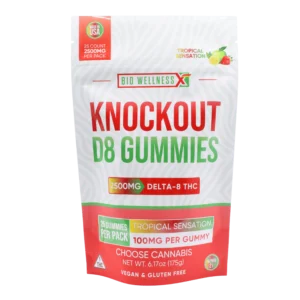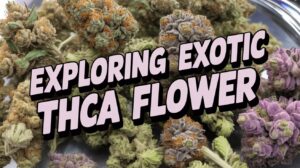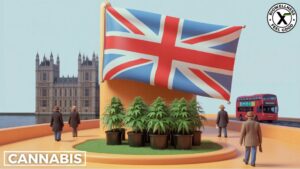Navigating the legal landscape of cannabis compounds can be complex, particularly with emerging variants like Delta-8 THC. In Vermont, understanding the legal status of Delta-8 is crucial for both consumers and business owners seeking clarity.
This article takes a deep dive into Vermont’s stance on Delta-8 THC, juxtaposing state regulations with federal laws, while offering guidance on where to procure legal Delta-8 products.
We’ll also provide essential dosing advice and analyze cannabis strains pertinent to Vermont’s market.
Key Takeaways
- Delta-8 THC and other synthetic cannabinoids are considered a controlled substance in Vermont.
- In 2018, federal law legalized the hemp product with the US Farm Bill.
- Though generally considered legal at the federal level, Vermont and other states have put in place their own laws.
- With rapidly changing cannabis laws, Vermont producers and consumers should check this article often for legal updates on Delta-8 THC.
Delta-8 THC Legality in Vermont
So, Vermont treats Delta-8 THC a bit differently than other hemp products. According to state regulations, it’s a controlled substance.
In April 2023, the Vermont agency, Cannabis Control Board, dropped the legal hammer, saying no to hemp-derived synthetically-produced cannabinoids like Delta-8 and Delta-10. Yep, that’s the official red flag on the Delta-8 parade. The law clearly bans the compound and any products made from the compound. This includes all THC isomers, variants, and analogs made from industrial hemp.
Delta-8 THC is prohibited in the state of Vermont.
Understanding the ins and outs of Vermont hemp rules, especially around Delta-8, helps everyone stay on the right side of the law. It’s about being smart and responsible – whether you’re a producer, a retailer, or a customer.
Now, there are some online shops that will ship Delta-8 products to Vermont, but I’d urge any curious consumers to stay compliant and keep themselves safe.
Is Marijuana Legal in Vermont?
While Delta-8 is illegal in Vermont, the Green Mountain State has given the green light to marijuana for adults who just want to kick back and enjoy it recreationally.
Here’s the breakdown for those 21 years and older: you can possess up to one ounce of cannabis, have two mature plants, and four immature ones. But wait, there’s a catch — harvested marijuana doesn’t count if it’s stored right where it was grown, indoors, with some “reasonable precautions” to keep it on lockdown.
Now, the party rules: smoking in public spots like streets, parks, schools, and public buildings is a big no-no. Municipalities can lay down the law with civil ordinances, making public pot puffing even more costly.
Landlords also hold a lot of power of their tenants. They can restrict marijuana in lease agreements, banning both possession and use. Tenants, on the other hand, should feel welcome to flex their green thumb unless the lease says otherwise. If the landlord’s cool with it, tenants are good to go.
For patients, Vermont’s been rocking medical marijuana since 2004. But with the new adult-use laws, everyone 21 and up is free to enjoy all the benefits.
Federal Laws About Delta-8 THC
So, you might know that back in 2018, the bigwigs in Washington D.C. passed the Agriculture Improvement Act, making it federally legal to grow hemp and make stuff from it, as long as it didn’t have over 0.3% of Delta-9 THC.
Now, here’s where it gets a bit sticky.
Delta-8 THC is this compound that’s kind of a cousin to the more famous Delta-9 THC, and it’s made through a chemical process that tweaks CBD from hemp plants. Some folks are scratching their heads, wondering if this makes it legal or not. On one hand, it comes from hemp, which should be a green light. But then the DEA comes in with a rule that might call Delta-8 a no-go because it’s a synthetic cannabinoid, and those can be a big no-no under the Controlled Substances Act.
As of today, however, industry experts generally consider Delta-8 THC legal at the federal level.
Just be sure to check this article every few weeks and keep informed, as cannabis laws change often.
Buy Legal Delta-8 THC at BioWellnessX
With Delta-8 THC not being legal in the state of Vermount many still orders online, however, to be on the right side of the law there are other hemp-derived products that follow the laws there besides Delta-8 THC products. Some of these are Delta-9 THC gummies with a max of 0.30% THC per gummy. These are legal in most states unless they are a completly THC free state like Idaho.
Now if you are outside of the states, say in one of the neigbors states Massachusetts you are allowed to purchase Delta-8 THC, that are both legally compliant, and high-quality, BioWellnessX is here to light the way.
It’s a place where cannabis enthusiasts can come together and safely explore what hemp-derived products to offer, all within the cozy embrace of the law.
- Quality you can depend on: We ensure every product is thoroughly checked for purity.
- Stay on the cutting edge: Our products are crafted to bring some extra zest to your life.
- Make informed health choices: We’re here to support you as you take charge of your wellness.
In Vermont, the hemp scene is always evolving. Even though Delta-8 is prohibited today, who knows what the future may hold?
When you’re ready to explore premium hemp-derived Delta-8, check out BioWellnessX! Especially if you want some of our high potency Delta 9 THC products.
Safe and Responsible Dosing Tips
If you’re exploring the world of Delta-8 THC, it’s super important to stick to safe dosing habits.
Whether you’re a new user, or cannabis professional, we always recommend starting things off with a small amount and taking your time. Every new product will interact with your system differently. And since everyone’s body works with Delta-8 THC a bit differently, pay close attention to how you feel and tweak things as needed.
Remember, a little can go a long way – especially for potent products like 100mg Delta-8 Knockout gummies. It’s always best to seek out top-notch hemp products and get advice from folks who know their stuff. Safety should always be your sidekick when you’re trying out new experiences.
Finally, consult a Delta-8 THC percentage chart for more in-depth dosage tips.
Enjoying Delta-8 should be a positive, health-friendly adventure. So, embrace the goodness, treat Delta-8 with respect, and be a role model for smart, responsible use.
Comparing and Contrasting Relevant Cannabis Strains
In the quest to fully grasp the cannabis landscape, it’s crucial to spotlight the distinct profiles of Delta-8 THC, with its nuanced psychoactive experience, and Delta-9 THC, renowned for its potent high and longer-lasting effects.
Meanwhile, CBD stands out as a non-intoxicating alternative that boasts therapeutic potential without the legal complexities often surrounding its psychoactive counterparts.
As entrepreneurs and enthusiasts, our understanding of these cannabinoids empowers us to navigate Vermont’s legal framework and cater to the nuanced demands of the market with confidence and legal compliance.
Delta-8 THC
Delta-8 is a close cousin of Delta-9 THC, which you might know from traditional marijuana. But here’s the thing – Delta-8 has its own chill vibe. It’s milder and doesn’t hit you as hard (it can still hit hard just milder than D9,) making it a favorite for folks who want a more relaxed psychoactive experience.
Imagine Delta-8 THC as a gentle hug for your body and mind, helping you unwind without knocking you off your feet. It’s like a whisper of joy that tickles your senses just enough to make you smile. As far as experience, most users compare it to an indica strain – sedative, relaxing, and calming.
Delta-8 THC is for anyone looking to find that sweet spot in their cannabis journey, where everything feels just right. It’s all about harmony, and let me tell you, this little compound knows how to balance things out. As far as benefits, there’s not a ton of research on Delta-8 THC itself, but it’s safe to compare benefits to Delta-9 THC. That is to say, it may help with stressful situations, or to relieve common aches and discomfort.
And that’s a brief scoop on Delta 8 THC!
It’s a game-changer for many, offering a more clear-headed, manageable, and enjoyable twist on the THC experience.
First-time user? Try a FREE Sample of Delta-8 THC here.
Delta-9 THC
Now, if you’ve ever tried a cannabis strain that’s packed with Delta-9 THC, you might’ve felt some pretty strong vibes. This compound is known for giving a more intense buzz compared to Delta-8 THC. Each strain brings its own kind of magic, with different feelings and how long they stick around.
When you take a journey with Delta-9 products, it can feel like opening a door to a new world. You might find yourself wrapped up in a wave of happiness, noticing the world around you in a new light, or getting struck by a lightning bolt of creativity. It’s not just about getting high; it’s about the whole experience that can be both fun and sometimes even soothing.
Take Sativa strains such as Sour Diesel – they’re like a burst of energy that can keep you moving and grooving for a good while. Then you’ve got Indicas like Granddaddy Purple, which are more about chilling out, maybe even leading you to the land of dreams.
Hemp-derived Delta-9 is kind of the best of both worlds, acting like a traditional hybrid strain. A great balance of energy, focus, relaxation and euphoria.
As far as legality, Delta-9 is more heavily restricted both federally and across all 50 states. So be sure to know your local laws before walking around with a pocket full of Delta-9 THC gummies.
Cannabidiol (CBD)
When the buzz of hemp-derived THC isn’t what you’re after, Cannabidiol (CBD) steps in as a friendly neighbor. It’s not psychoactive, with all the goodness working behind the scenes, so the legal side of things tends to give it a thumbs up.
CBD is like a cozy blanket for your nerves, soothing your mind when its too stressed out – a true sanctuary when life’s hustle and bustle gets too loud. If you’ve got aches and pains that won’t quit, CBD comes to the rescue, easing discomfort.
Many users also turn to CBD for sleeping problems. It’s like the caring friend who insists you rest when you’re worn out, promoting that deep, restorative sleep we all crave. Instead of some chemical solutions, CBD wont leave you feeling groggy or out of it in the morning, either.
Along with all these benefits, CBD is also more widely accepted across the nation. With no psychoactive effects, you should have no problem finding CBD products in Vermont – or anywhere else!
Final Thoughts: Is Delta-8 THC Legal in Vermont
In conclusion, the intricate legal landscape surrounding Delta-8 THC in Vermont centers around evolving policies on cannabis derivatives. While the state navigates the balance between federal guidelines and local statutes, consumers seeking Delta-8 THC must prioritize compliance with current regulations.
Unfortunately, that means it will be difficult to find Delta-8 in Vermont. The state currently prohibits the THC isomer, and all other THC variants in the hemp plant. Instead, cannabis enthusiasts can turn to hemp-derived products with 0.30% Delta-9 THC or lower, or zero-THC CBD products.
Awareness and education on responsible consumption are imperative. Vermont’s approach to Delta-8 THC underscores the broader dialogue on cannabis reform, showcasing the need for clear, accessible information to guide both consumers and entrepreneurs in this dynamic industry.

Legal Disclaimer:
By reading this information presented, you agree to release the author of any liability that comes from using this data. This post contains no legal advice. Claims about cannabinoids have not yet been approved by the FDA. Read the full legal disclaimer here.
Other Related Articles About Delta-8 THC
- Delta-8 vs. Delta-10 For Pain: Which Works The Best?
- Organic 50mg Delta-8 Gummies: Benefits and Effects
- 100mg Delta-8 THC Gummies Review From BioWellnessX
- Indica vs Sativa Edibles: What’s the Difference?
- Delta 8 Edibles Review And Where to Buy Them!
- Is Delta-8 or CBD Better For Pain? The Top 5 Differences!
- Delta-8 THC Near Me: Best Places To Buy Delta-8 Products!
Curious About Vermont’s Surrounding State Laws?
References:
- Vermont Delta-8 Legality
- Is Delta-8 Legal: A State-by-State Guide
- 5 Things to Know about Delta-8 Tetrahydrocannabinol – Delta-8 THC
- Delta-8-THC: Delta-9-THC’s nicer younger sibling?
- Consumer Experiences with Delta-8-THC
- Hemp Production and the 2018 Farm Bill – 07/25/2019 | FDA
- The Controlled Substances Act (dea.gov)
FAQs About Delta-8 Legality in Vermont
The Vermont state government categorizes Delta-8 THC as a psychoactive cannabinoid similar to Delta-9 THC, with a differing chemical structure that impacts its legality and regulatory status within the state.
Shipping Delta-8 THC products to Vermont from states where it is legal may contravene local regulations. Entrepreneurs must ensure compliance with Vermont’s state laws to avoid legal complications in interstate commerce.
Retailers in Vermont must adhere to specific licensing requirements to sell hemp infused product, or Delta-8 THC products, ensuring compliance with state regulations and maintaining the integrity of the market for responsible adult consumers.
Vermont law regulates hemp farmers and processors rigorously, ensuring the production and sale of Delta-8 THC align with state mandates, maintaining strict adherence to quality and legal standards within the industry.
Individuals found possessing or distributing Delta-8 THC in violation of Vermont’s regulations may face legal repercussions, including fines and incarceration, underscoring the importance of compliance with state limits and guidelines.
Other Fun Facts About the State of Vermont
- Maple Syrup Capital: Vermont is renowned for its high-quality maple syrup. The state produces the largest amount of maple syrup in the United States. The process of collecting sap from sugar maple trees and turning it into syrup is a traditional and important part of Vermont’s culture.
- Ben & Jerry’s Origins: The famous ice cream company Ben & Jerry’s was founded in Burlington, Vermont, in 1978. Visitors can tour the Ben & Jerry’s Factory in Waterbury to learn about the ice cream-making process and, of course, sample some delicious flavors.
- Green Mountain State: Vermont is often referred to as the “Green Mountain State” due to the presence of the Green Mountains that run north-south through the state. These mountains offer stunning landscapes, hiking trails, and outdoor recreational opportunities.
- Birthplace of Presidents: Vermont is the birthplace of two U.S. presidents: Chester A. Arthur and Calvin Coolidge. Coolidge, the 30th president, was born in Plymouth Notch, and his childhood home is now a historic site.
- No Billboards Allowed: Vermont is one of the few states in the U.S. that prohibits the use of billboards. This has contributed to the state’s scenic beauty, with its lush landscapes free from the visual clutter of roadside advertisements.
- First State to Abolish Slavery: Vermont was the first state in the United States to abolish slavery through its state constitution in 1777. This commitment to freedom and equality reflects the state’s progressive values.
- Lake Champlain Monster: Lake Champlain, which extends into Vermont, is said to be the home of “Champ,” a legendary lake monster similar to the Loch Ness Monster. Sightings and stories of Champ have been part of Vermont folklore for centuries.
- Covered Bridges: Vermont is known for its picturesque covered bridges. These historic structures, often associated with rural charm, can be found throughout the state. The covered bridges add a touch of nostalgia to Vermont’s scenic countryside.









